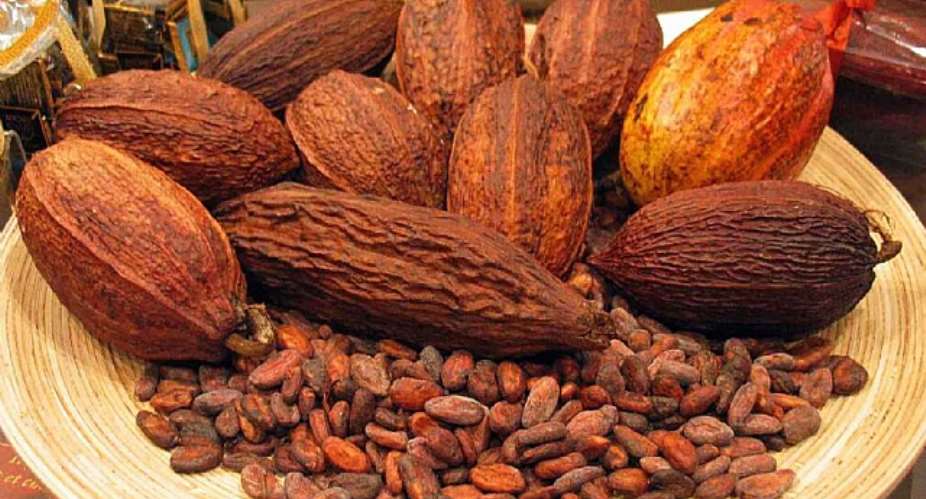The Ghana Cocoa Board has denied media reports that cocoa from Ghana will soon be prohibited from entering the international market due to high incidence of pesticide residue in the beans.
According to a statement signed by the Chief Executive, Mr Anthony Fofie, Ghana's cocoa does not face any imminent ban on the international market.
The statement said COCOBOD placed premium on the health of consumers of cocoa and, therefore, has put in place quality control mechanisms to ensure that Ghana's cocoa is free from all foreign matter as well as chemicals.
Below is the full statement
Ghana Cocoa Board (COOCBOD) has noted with concern issues raised in the media, particularly in the Daily Guide of Wednesday, 23rd October, 2013 indicating that Ghana's cocoa will soon be prohibited from entering the international market due to high incidence of pesticide residue in the beans.
We wish to inform our cherished cocoa farmers and the general public that Ghana's cocoa does not face imminent ban on the international market.
COCOBOD places premium on the health of consumers of cocoa and, therefore, has put in place quality control mechanisms to ensure that Ghana's cocoa is free from all foreign matter as well as chemicals.
All pesticides used in the cocoa industry are screened at Cocoa Research Institute of Ghana, to ensure that they comply with EU, Japanese and other markets requirements for food safety, Maximum Residual Level (MRL) limits and sanitary and phyto-sanitary standards before they are certified for use on cocoa.
In furtherance of these stringent measures, COCOBOD is partnering Japan International Cooperation Agency (JICA) and Cocoa and Chocolate Association of Japan (CCAJ) to enhance the capacity of staff of Quality Control Company on pesticide residue analysis.
The Cocoa Extension Services of the COCOBOD regularly updates farmers' skills in the application of pesticides. In addition, well-trained spraying gangs have been engaged by COCOBOD to undertake the National Control of pests and diseases programme for farmers.
Whilst there are challenges in the management of cocoa pests and diseases through pesticides application, there is no truth in the assertion that Ghana's cocoa is facing imminent ban on the international market. On the contrary, Ghana's cocoa is the benchmark for quality evaluation and attracts a premium from the international market.
We strongly urge all companies who wish to procure or sell pesticides for use on cocoa to follow the approved procedures for testing and approval of chemicals by COCOBOD. We are aware of the presence of unapproved pesticides on the market not meant for cocoa but which invariably may be patronized by unsuspecting farmers. This problem calls for vigilance on the part of the Environmental Protection Agency and the Plant Protection and Regulatory Services of the Ministry of Food and Agriculture.
We wish to allay the fears this publication might have caused our farmers and consumers, and assure them that COCOBOD is committed to ensuring that cocoa that leaves the shores of Ghana is not only of premium quality but also free from pesticides residue and meet Maximum Residue Levels (MRL) as set by the EU and other consumers.
SIGNED
CHIEF EXECUTIVE
Graphic.com.gh/Ghana





 Former Kotoko Player George Asare elected SRC President at PUG Law Faculty
Former Kotoko Player George Asare elected SRC President at PUG Law Faculty
 2024 elections: Consider ‘dumsor’ when casting your votes; NPP deserves less — P...
2024 elections: Consider ‘dumsor’ when casting your votes; NPP deserves less — P...
 You have no grounds to call Mahama incompetent; you’ve failed — Prof. Marfo blas...
You have no grounds to call Mahama incompetent; you’ve failed — Prof. Marfo blas...
 2024 elections: NPP creates better policies for people like us; we’ll vote for B...
2024 elections: NPP creates better policies for people like us; we’ll vote for B...
 Don’t exchange your life for wealth; a sparkle of fire can be your end — Gender ...
Don’t exchange your life for wealth; a sparkle of fire can be your end — Gender ...
 Ghana’s newly installed Poland train reportedly involved in accident while on a ...
Ghana’s newly installed Poland train reportedly involved in accident while on a ...
 Chieftaincy disputes: Government imposes 4pm to 7am curfew on Sampa township
Chieftaincy disputes: Government imposes 4pm to 7am curfew on Sampa township
 Franklin Cudjoe fumes at unaccountable wasteful executive living large at the ex...
Franklin Cudjoe fumes at unaccountable wasteful executive living large at the ex...
 I'll 'stoop too low' for votes; I'm never moved by your propaganda — Oquaye Jnr ...
I'll 'stoop too low' for votes; I'm never moved by your propaganda — Oquaye Jnr ...
 Kumasi Thermal Plant commissioning: I pray God opens the eyes of leaders who don...
Kumasi Thermal Plant commissioning: I pray God opens the eyes of leaders who don...
